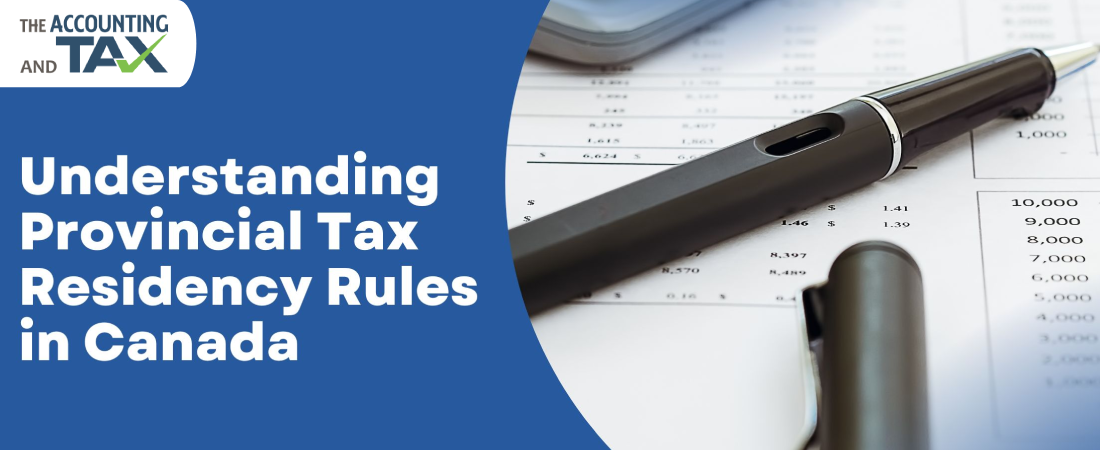
Understanding Provincial Tax Residency Rules in Canada
As a Canadian resident, you are generally required to pay income taxes not only to the federal government but also to the province or territory in which you reside. However, determining your provincial tax residency can be more complex than it seems, as each province and territory has its own set of rules and criteria for establishing tax residency. In this comprehensive blog post, we’ll explore the key principles and considerations surrounding provincial tax residency in Canada.
The Significance of Provincial Tax Residency
Provincial tax residency is crucial for several reasons:
- Provincial income tax rates: Each province and territory has its own income tax rates, which can vary significantly. Your provincial tax residency determines the rates applicable to your taxable income.
- Tax credits and deductions: Many tax credits and deductions, such as those related to medical expenses, tuition fees, and rental properties, are based on provincial residency rules.
- Compliance obligations: Depending on your provincial residency, you may be subject to different filing requirements, deadlines, and reporting obligations.
- Tax agreements: Some provinces and territories have tax agreements or arrangements with other jurisdictions, which can impact your tax obligations and filing requirements.
Given the potential impact on your overall tax liability and compliance obligations, it’s crucial to understand the rules and criteria used to determine your provincial tax residency.
Provincial Residency Tests
While the specific rules may vary slightly across provinces and territories, most jurisdictions use a combination of the following tests to determine an individual’s tax residency:
1. Residential Ties Test:
This test examines various residential ties or connections an individual has with a particular province or territory. These ties can include:
– A home or dwelling place (owned or rented)
– Spouse or common-law partner’s residence
– Personal and economic interests (e.g., employment, business interests, investment assets)
– Social ties (e.g., memberships, religious affiliations, recreational activities)
The more residential ties an individual has with a province or territory, the stronger the case for establishing tax residency there.
2. Physical Presence Test:
This test considers the amount of time an individual spends physically present in a particular province or territory during the tax year. Generally, if an individual is physically present in a jurisdiction for a certain number of days (often 183 days or more), they may be considered a tax resident of that province or territory.
3. Permanent Home Test:
Some provinces and territories may consider an individual’s permanent home or principal residence as a primary factor in determining tax residency. If an individual maintains a permanent home in a particular jurisdiction, they may be deemed a tax resident of that province or territory, even if they spend significant time elsewhere.
It’s important to note that these tests are not always applied uniformly across all provinces and territories, and some jurisdictions may place more emphasis on certain factors over others.
Special Considerations and Exceptions
In addition to the general residency tests, there are some special considerations and exceptions to be aware of:
- Temporary Absences: If you are temporarily absent from your home province or territory for reasons such as work, vacation, or study, you may still be considered a tax resident of that jurisdiction, provided your residential ties remain strong and you intend to return.
- Multiple Residencies: In cases where an individual has significant residential ties to more than one province or territory, specific tie-breaker rules may be applied to determine the primary place of residence for tax purposes.
- International Residency: If you are a Canadian resident for tax purposes but spend significant time outside of Canada, you may still be subject to provincial tax obligations based on your residential ties within Canada.
- Provincial Tax Credits and Rebates: Some provinces and territories offer tax credits or rebates for individuals who relocate or establish residency within their jurisdiction, which can impact your overall tax liability.
Professional Assistance and Resources
Given the complexity and nuances of provincial tax residency rules, it’s often advisable to seek professional assistance from a qualified tax advisor or accountant, especially if your situation involves multiple jurisdictions or unique circumstances.
A tax professional can help you:
– Assess your specific situation and determine your likely provincial tax residency
– Understand the potential tax implications of your residency status
– Ensure compliance with relevant filing requirements and deadlines
– Identify any available tax credits, deductions, or rebates based on your residency
– Provide guidance on tax planning strategies related to residency changes or multiple residencies
Additionally, the Canada Revenue Agency (CRA) and provincial tax authorities provide resources and publications that outline the residency rules and criteria for each jurisdiction. These resources can be valuable references when navigating provincial tax residency matters.
Conclusion
Provincial tax residency is a critical consideration for Canadian taxpayers, as it can significantly impact your overall tax liability, compliance obligations, and eligibility for various tax credits and deductions. By understanding the key residency tests and factors used by each province and territory, you can better determine your tax residency status and ensure compliance with relevant tax laws and regulations.
While the rules and criteria can be complex, particularly in cases involving multiple residencies or unique circumstances, seeking professional guidance from a qualified tax advisor can provide invaluable assistance and ensure that you are meeting all your provincial tax obligations accurately and efficiently.
Ultimately, staying informed about provincial tax residency rules and seeking expert advice when needed can help you navigate this aspect of the Canadian tax system with confidence and minimize potential issues or penalties down the line.
